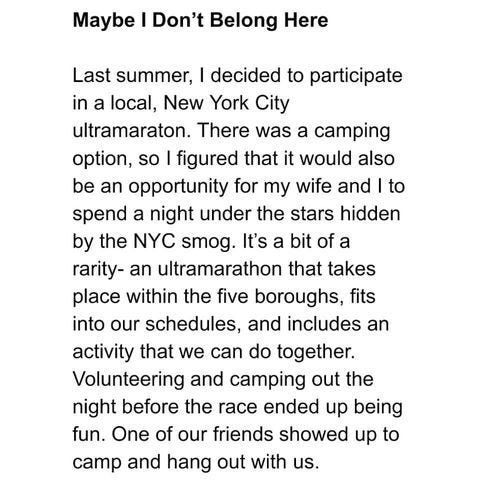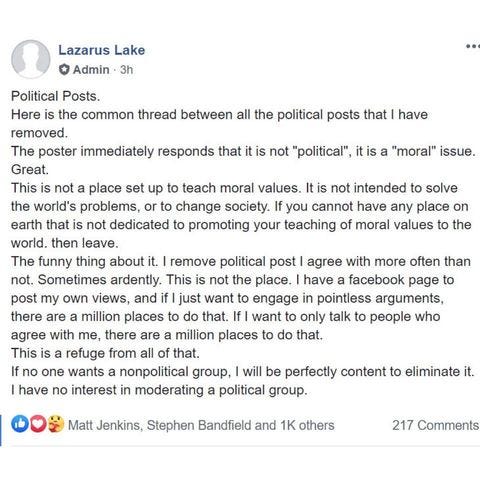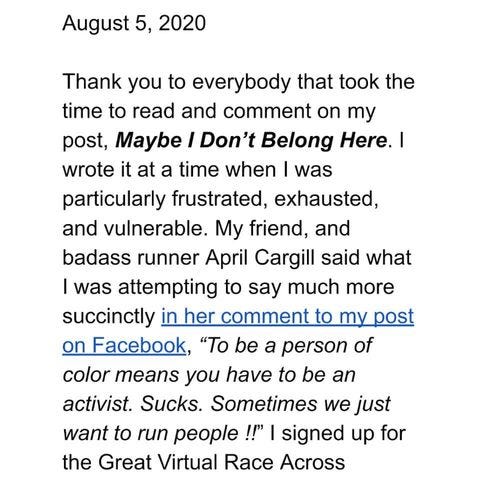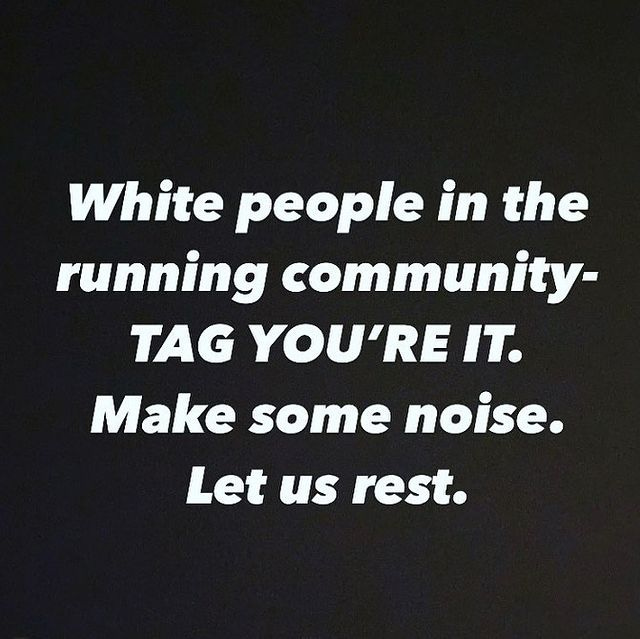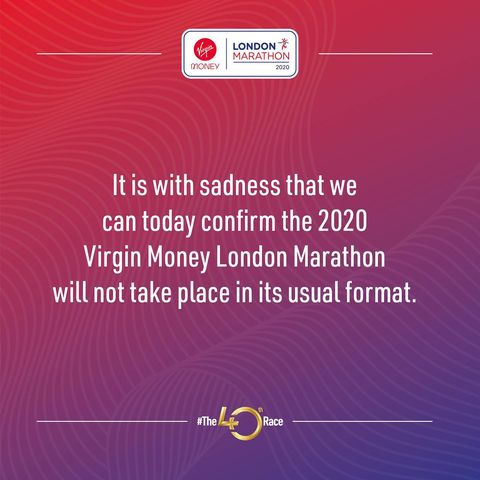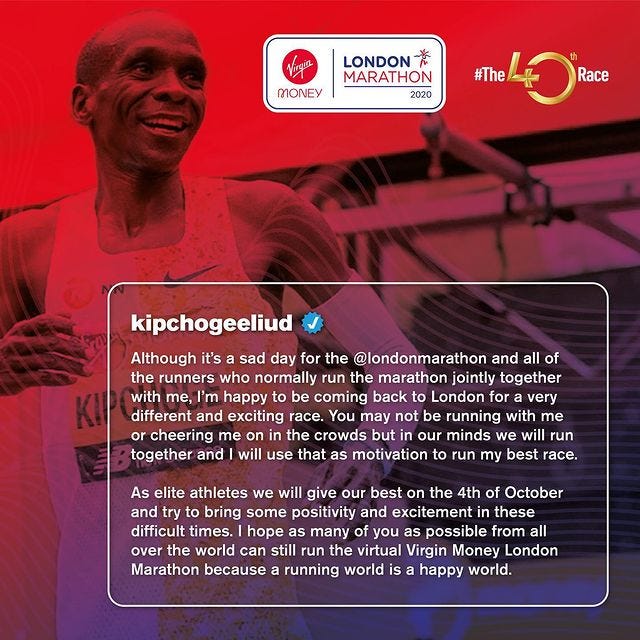The London marathon goes elite-only, but promises the showdown of the year with Kipchoge v. Bekele
And another Canadian marathon falls to COVID-19: the Blue Nose marathon in Halifax
Hello!
I hope you’re doing well and handling this summer heat OK. The weather’s been great in Toronto — enjoyable for summer but tough for running.
This week’s newsletter has a lot of podcast episodes for you to enjoy, an update on the 2020 London marathon and some other news you might be interested in. But it kicks off with a look at what went down this week in the Facebook group dedicated to the Great Virtual Race Across Tennessee. I’m writing about it here because I kinda got involved and this kind of thing happens in running groups everywhere, and it’s a good reminder of how racism and exclusion can permeate groups even when you believe you’re not racist and your group isn’t racist.
Let’s get to it.
— Erin @ Run the North
There’s no room for “politics” (but plenty of room for racism) in the Great Virtual Race Across Tennessee 1000K
In April, I signed up for the Great Virtual Race Across Tennessee, a 1022km summer-long experience organized by Lazarus Lake, the founder of the famous Barkley Marathons. I wrote about it in this newsletter. I got some friends to sign up for it. I’d been running almost every day since the pandemic began and it was nice to give all this running some structure and purpose.
Laz made a Facebook group for the race. Of the nearly 20,000 people who signed up for the race, 11,000 are in the group. It’s mostly a place to celebrate your finish, lament the difficulty of the race. Typical stuff.
Then, this past week, that all changed.
What happened?
Last week, Ben Chan (@malerunner on Instagram) finished his race. He posted about it in the group. He wore a Black Lives Matter singlet in his finish photos and in the recap, cited the racist and homophobic slurs lobbed his way while he was out running his miles.
13 hours later, his post was deleted from the group.
He posted this to Instagram in response. Click through to read the whole thing, it offers important political and racial historical context for Laz’s biggest race, the Barkley marathons:
I saw this, as it was blowing up on Instagram. I first saw it when @Fast_Women shared it.
But I didn’t see any talk about it in the original Facebook group.
So I posted it.
My post read: “Was disappointed to read this Instagram post and learn how this group is being moderated. Please take a moment to read it.”
I thought this was pretty innocuous.
One hour later, my post was deleted. The rule I broke was that my post was “political.”
About an hour after that, Laz posted a (now deleted) post about how this race was no place for “politics.”
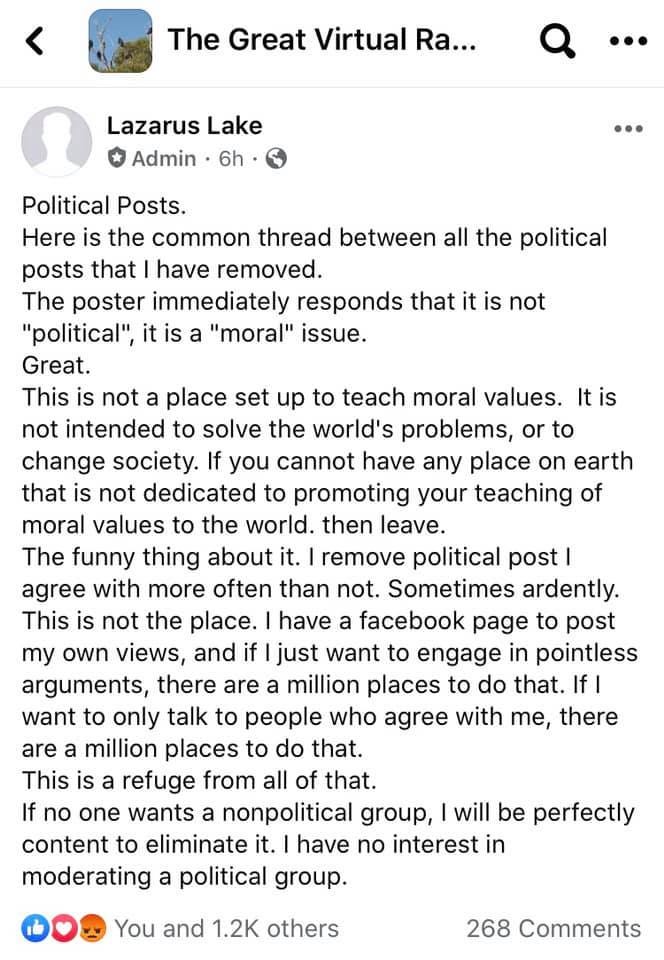
(Thanks to @Fast_Women for this screenshot!)
After that went up, Chan wrote this on Instagram: (the first slide is Laz’s post, click through to read the whole thing):
In an effort to combat racism in this group, Laz decided to silence the voices of marginalized and BIPOC runners and those who called him out on this practice, instead of silencing those who were posting racist stuff.
The overwhelming consensus in the comments of the now-deleted post outlining Laz’s stance on “political” posts thanked him for it, appreciating the “refuge” he made for them.
This leaves me with two questions for Laz, and for the group as a whole.
Who is this a refuge for?
I believe Laz when he says he believes Black Lives Matter. But actions speak louder than words. By deleting Ben’s post and my post (and who knows how many other posts I missed), the message is clear: he’d rather make a group of white people with potentially problematic views — people who think they can ignore racism when it’s tiring or inconvenient — feel comfortable than participate in the anti-racism work he claims to support.
How can ultrarunning and this group be a refuge for people like me who simply say “Hey, that’s not cool, can you think about it for a minute,” only to get silenced by Laz himself and told by fellow runners that I’m “throwing [Laz] under a bus.”
And, more importantly, how can ultarunning and groups like this be a refuge for people like Ben, whose can’t even share his lived experience of this race because it makes other people uncomfortable?
Who gets to decides what is and it not political?
This idea that we can escape from politics is total bullshit.
Everything is political.
Running is political: Running alone safely. Running on public trails. Having races. Buying $100 running shoes made in China. Syncing our watches to satellites sent to the sky by major tech companies.
Life is political: Five-day work weeks. Public education. Having vacation time and a pension. Access to alcohol. How you travel to and from work. Travelling internationally. The food you eat, and how it got from the ground it grew to your plate. The kind of housing available to you. Minimum wage. Mortgage rates. Women working. Having children. Not having children. Getting cancer and managing its treatment and how you pay for it. How various countries have responded to this pandemic.
I could go on.
Because it’s all political.
At some point, decisions were (or were not) made by political institutions and governments to make these things what they are right now.
It’s an extraordinary privilege (and ignorant of the history of so many daily things we take for granted) to determine that something is not “political” and therefore has no place in your life/run crew/Facebook group/dinner party.
Diversity and inclusion expert and DC-based runner Courtney Dredden Carter (@eatprayrun on Instagram) posted this in response to it all:
What’s next?
Ben’s advice for fellow BIPOC runners is to take up space. Sign up for the races. Make your presence known.
Click through to read the whole post:
As for white people? Runner and activist Alison Désir posted this in an Instagram story:
“White people in the running community: TAG YOU'RE IT. Make some noise. Let us rest.”
And as of Saturday afternoon, it looks like Laz is out there, still deleting “political” posts, and hasn’t learned yet from this experience:
2020 London marathon to be elite-only, with a showdown between Eliud Kipchoge and Kenenisa Bekele
The London marathon announced this week that the 2020 edition will be an elite-only event. They will not use the original course, but rather an enclosed loop in St. James Park that will be a “secure biosphere.” Spectators will not be allowed.
As previously announced, performances at the London marathon will count towards Olympic qualification.
The elite race will feature what was the most anticipated match-up of 2020 marathoning: world record holder Eliud Kipchoge going head-to-head with Kenenisa Bekele. Eliud broke the world record and ran 2:01:39 in Berlin in 2018. The following year, Bekele ran 2:01:41 — the second fastest official marathon time ever.
Kipchoge and Bekele have raced each for years, on the track, in cross-country and even in the marathon.
They’ve run 42.2K together five times previously, with Kipchoge besting Bekele every time:
2014 Chicago: Eliud won in 2:04:11, Bekele came fourth in 2:05:51
2016 London: Kipchoge won in 2:03:05 and Bekele came third in 2:06:36
2017 Berlin: Kipchoge won in 2:03:32 and Bekele dropped out
2018 London: Kipchoge won in 2:014:17 and Bekele placed sixth in 2:08:53
Over shorter distances, Bekele won more races than Kipchoge. According to Citius Mag, Bekele is 16-9 overall when all race distances are counted.
The elite field will also feature women’s world record holder Brigid Kosgei. She ran 2:14:04 in Chicago last year to break Paula Radcliffe’s long-standing record.
The rest of the elite field has not been announced.
Four elite Canadians were set to run London back in April: Kinsey Middleton, Tristan Woodfine, Evan Esselink and Ben Preisner. It remains to be seen if any Canadians will commit to the London race, and if they do, what protocols for international travel will look like.
Those with entry to the mass participation race will be able to defer to the 2021, 2022 or 2023 race. There will also be a virtual version of the race on Oct. 4.
The 2021 race has been moved to Oct. 3, 2021 to give it the best chance to actually taking place due to COVID.
I’ve ben looking into broadcast details, and I believe the best bet will be watching it on the Olympic Channel, which is now available to stream for free on CBC Gem. Once I confirm this, I’ll share more details.
Blue Nose Marathon in Halifax goes virtual
The Blue Nose marathon in Nova Scotia announced it will be virtual in 2020.
This means there are two fall Canadian marathons still standing, that I’m aware of: the Manitoba Marathon (Oct. 11) and the Valley Harvest marathon in the Annapolis Valley in Nova Scotia (Oct. 11).
Brandon McBride speaks out about racism he’s experienced

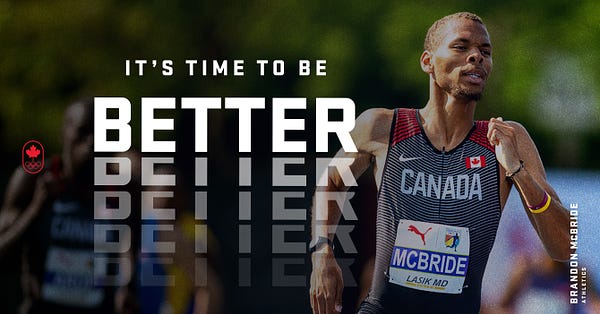
Canadian 800m record holder Brandon McBride is featured in a piece on the Team Canada website, where he talks about racism he’s experienced as an elite runner. It’s not the first time the 26-year-old from Windsor, Ont., has discussed the topic — he was part of a panel about racism in running for CBC Sports I featured a few weeks ago.
In the Team Canada piece, he talks about the racism he experienced while at university in Mississippi, how Canada isn’t any better than the U.S., and the toll experiencing racism puts on his mental health:
“The toughest part of the type of racism we experience here in Canada is that it’s the type of racism that’s covert,” McBride explained. “It’s a smile on your face, but I’m calling you a racial slur behind your back; I’m saying that I’m joking to you, to your face and smiling, but I’m making backhanded compliments.”
In all its forms, racism has taken its toll on McBride’s mental health.
“Imagine having to go through that every single day,” he related. “The first couple of times, yes, you can walk away, yes, you’re not going to be angry. But compounded over 25, 26 years dealing with that every day, you might be different. You might be a little more angry than you are right now.”
He also discussed what Canada and our various athletic bodies can do to improve the situation and how he hopes to support up-and-coming athletes.
You can read the whole piece here.
Cool performances
🌟Lucia Stafford broke the U23 1000m record, running 2:38.70. The record has stood since 1973, She was paced by her sister Gabriela DeBues-Stafford. It was sanctioned, so it will count as an official record. Canadian Running has more.
🌟Yana Hempler decided to run 10 marathons in 10 days to raise money for the Victoria Hospitals Foundation. Her goal was $10,000. She’s raised more than $20,000. At some point, she decided to add two more marathons to her plan, running 12 marathons in 12 days. The effort was a Canadian record for most consecutive marathons by a female. Yana chronicled the whole thing on her Instagram, you can check it out here. CTV Edmonton covered her story, and you can read that here.
🌟 The Race Across Nova Scotia was supposed to be a summer-long 793K event for most participants. For winner Kyla Gillis, it was an 14-day event. She completed the distance in 13 days, 19 hours and 35 minutes. Even more impressive, she completed it on top of working virtually (because of the pandemic) as a high school chemistry teacher. Canadian Running has more of her story.
Long-run listens: a podcast roundup
There are enough podcast episodes this week to give them their own sub-section.
🎧Mohammed Ahmed was on I’ll Have Another with Lindsey Hein. He talked about his NCAA career at the University of Wisconsin, training during quarantine and his performances at the Bowerman Track Club (his pro training team) intrasquad meets, including his Canadian record 12:47 in the 5,000m. He also talked a lot about poetry: the poetry he writes and the poetry his grandmother wrote and performed in Somalia.
🎧2016 Olympian and coach Jess O’Connell was on the Running Public podcast. This conversation really focused on the mindset of an athlete, how Jess instills that in her athletes and how she’s handling COVID and training through a pandemic.
🎧 The Longest Stride is a brand-new podcast that is highlighting runners in Toronto. Their fourth episode is a conversation with Lyndsay Tessier, the 41-year-old schoolteacher who represented Canada in the marathon at the 2019 world championships. They get deep into Lyndsay’s running history (she was a superstar runner in early high school before quitting, this “schoolteacher” headline is accurate but also reductive), and her rise to the top of Canadian marathoning.
🎧 Women Run Canada talked to Crystal Emmanuel, “Canada’s fastest woman.” Crystal is a two-time Olympian, a national champion in the 100m and the 200m and is the Canadian 200m record holder. It’s a good conversation about how Crystal got into running and how she finds her drive to keep pushing herself.
🎧 Marathoner Lanni Marchant was on her college alma mater’s podcast, Mocs on the Mic. Lanni went to the University of Tennessee Chattanooga. The conversation is about Lanni’s career from collegiate runner to Canadian marathon record holder and 2016 Olympian, and the struggles she’s faced in her career since 2016.
That’s it for this week!
I want to wrap by shouting out Alison Wade and the Fast Women newsletter. Alison writes about professional women’s running every Monday morning. It’s American-centric, but she covers some of the Canadian scene as well. We started our newsletters at the same time — January 2019 — and she’s become such a source of support and inspiration for me over the past year and a half. Support her work and subscribe to Fast Women. Run the North is better because Fast Women exists.
If you want to subscribe to Run the North, you can do so here:
Run the North comes out on Monday mornings (except on holiday Mondays, then it comes out Tuesday).
You can always reach me by replying to this issue or dropping me a note at runthenorthnews@gmail.com.
Thanks for reading, and keep on running.
I’ll see you next week.



